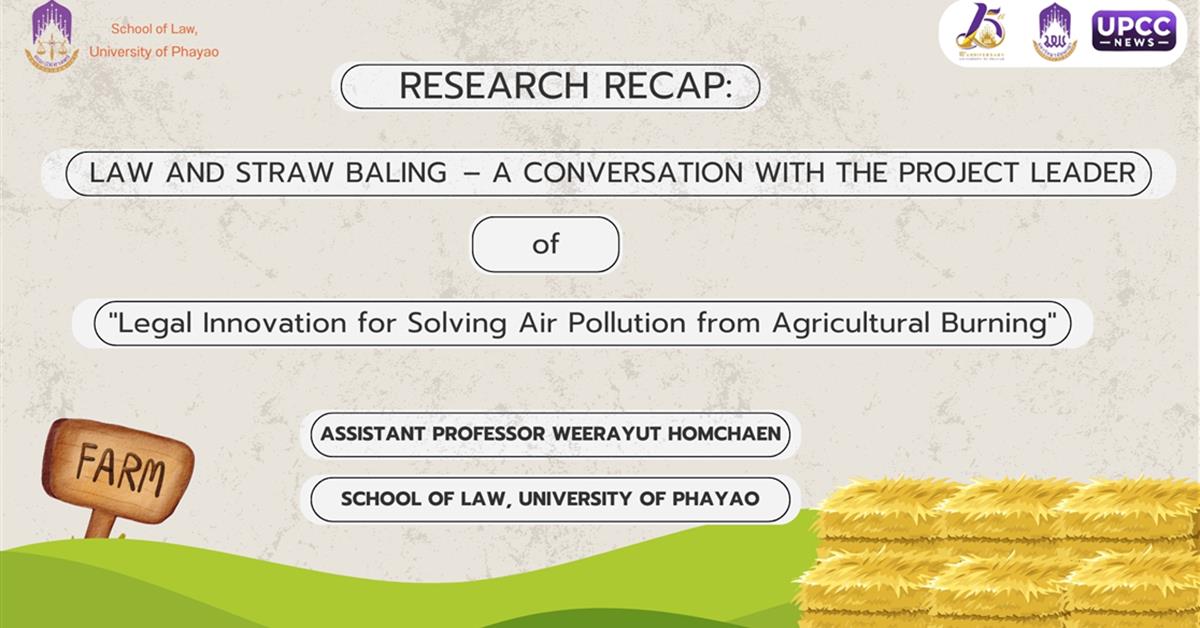
Assistant Professor Weerayut Homchaen, Assistant Dean for Research and Graduate Studies, School of Law, University of Phayao
The University of Phayao operates under the vision of being a "University to Create Wisdom for Sustainable Community Development with Innovations of International Standards." In order to bring this vision to life, the university actively conducts research and academic activities that benefit local communities. One of the most pressing issues facing our society today is air pollution, specifically PM 2.5 pollution caused by agricultural burning.
In response to this, the Innovation in Learning and Organizational Communication Division of the School of Law invited Assistant Professor Weerayut Homchaen, Assistant Dean for Research and Graduate Studies, and the project leader of "Legal Innovation for Solving Air Pollution from Agricultural Burning", to discuss legal innovations in environmental conservation. This research project recently won a gold medal in the "One Faculty, One Innovative Community" competition for 2024.
Q&A with Assistant Professor Weerayut Homchaen
Q: When people think of innovation, they usually imagine inventions or technological projects. However, in social sciences, especially in law, many may struggle to visualize what innovation looks like. What does the term "Legal Innovation" mean to you?
A: When discussing law, most people think of rules and regulations that define what is permissible and what is not. However, there are various tools to shape behavior, one of which is financial incentives that encourage desirable actions. In some cases, legal measures alone are insufficient, requiring the integration of other tools. The term "Legal Innovation" in this project refers to a hybrid approach that combines legal measures with economic incentives to tackle the issue of agricultural burning.
Q: At the "One Faculty, One Innovative Community" event in February 2025, attendees were surprised to see straw bales as the School of Law’s research output. Why did your team choose to support farmers in baling straw to address air pollution? And how does your research relate to legal studies?
A: The decision stemmed from a previous study on open field burning, which identified two key legal frameworks: the Public Health Act B.E. 2535 (1992) and the Disaster Prevention and Mitigation Act B.E. 2550 (2007). While the Public Health Act allows local authorities to issue individual burning bans, in practice, they often cannot identify the person responsible for burning, rendering the ban ineffective. On the other hand, the Disaster Prevention and Mitigation Act empowers provincial governors to impose temporary region-wide burning bans. However, these measures are only short-term solutions.
From the farmers’ perspective, burning rice straw is a longstanding tradition. A complete ban conflicts with their way of life, raising the question: How can we effectively address this issue?
Q: How did you select the target area, and what were the steps in implementing the project? Additionally, how can this legal innovation become sustainable after the project ends?
A: When the University of Phayao launched the "One Faculty, One Innovative Community" initiative for 2024, we submitted our research proposal to explore potential solutions. According to the initiative's guidelines, research had to be conducted in Mae Ka Subdistrict, Mueang District, Phayao Province. We chose Moo 15, Ban Kaset Suk as our target area simply because its name includes the word "Kaset" (which means "agriculture"), aligning well with our research topic.
To begin the project, we collaborated with the village headman to make an announcement and gather participants. At first, only five farmers showed up for the information session. We then proceeded to clarify the selection criteria, which stated that participants must:
1. Be a rice farmer in Mae Ka Subdistrict.
2. Agree to contribute additional community benefits.
A key condition was that the project would subsidize straw baling at 3 THB per bale, with a maximum quota of 500 bales per farmer. Once the first five farmers were trained, they were encouraged to invite other eligible farmers. In the end, 19 farmers joined the project.
Since local administrative organizations (LAOs) are responsible for regulating agricultural burning under the Public Health Act, we plan to transfer our research findings to Mae Ka Subdistrict Municipality after the project concludes. This will help establish a long-term strategy for addressing air pollution from agricultural burning in the area.
Q: What challenges did you face in conducting this research? Do you have any advice for researchers interested in legal environmental studies or applying for "One Faculty, One Innovative Community" projects?
A: One major challenge was that we did not collaborate with local administrative organizations from the beginning. As a result, these organizations lacked awareness and understanding of our approach, leading to concerns about its effectiveness. Future research should involve local authorities from the start to ensure smoother implementation.
Additionally, conducting legal research, especially in social science, often leads to abstract findings. However, research funding organizations increasingly demand empirical and quantifiable results. I encourage researchers to explore Social Return on Investment (SROI) analysis, which helps demonstrate the tangible impact of legal research beyond policy recommendations.
Interviewer: Miss Piyaorn Plianpadoong
Interviewee: Assistant Professor Weerayut Homchaen
School of Law, University of Phayao
📍 Address:
Old Lecture Hall Building (PKY), 19 Moo 2, Mae Ka Subdistrict, Mueang District, Phayao 56000, Thailand
📞 Contact Information:
• General Administration, Planning & Procurement: Ext. 1614
• Finance & Accounting: Ext. 1618
• Information Technology: Ext. 1137
• Student Affairs & Human Resources: Ext. 1851
• Academic Affairs: Ext. 1852
• Legal Clinic, Research & Academic Services: Ext. 1619
🌐 Website: https://law.up.ac.th/
📺 YouTube: LawUP Channel
🎵 TikTok: @lawup2023
📧 Email: law.up@up.ac.th